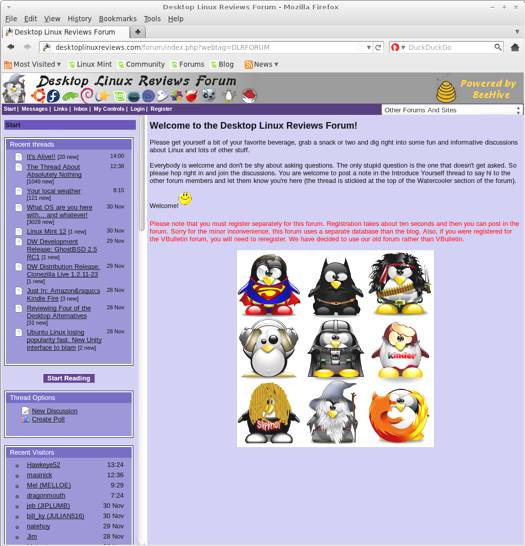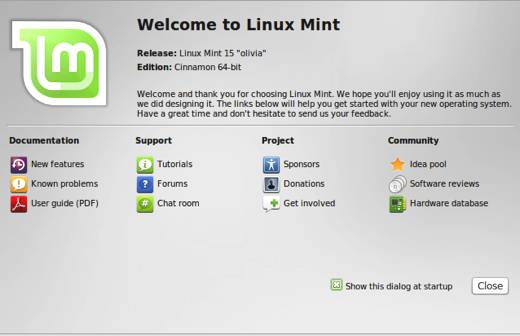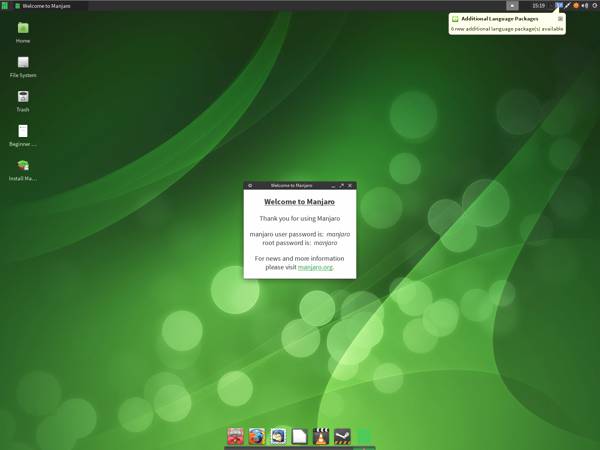Ubuntu 12.10 has been released. So it’s time for another review to see what’s in it, and if it’s worth considering as your preferred desktop distro.
In keeping with Canonical’s past tradition, Ubuntu 12.10 has a cute animal nickname. This time around it’s called “Quantal Quetzel.” You’re probably wondering what the heck a “quetzel” is, right? I was too, so I googled it and here’s what I found:

Click the image to browse books about quetzals.
Quetzals (play /k?ts???l/ or play /?k?ts?l/) are strikingly colored birds in the trogon family. They are found in forests and woodlands, especially in humid highlands, with the five species from the genus Pharomachrus being exclusively Neotropical, while the single Euptilotis species is almost entirely restricted to western Mexico also in Baja Verapaz, Guatemala . They are fairly large (all over 32 cm or 13 inches long), slightly bigger than other trogon species. Quetzals have iridescent green or golden-green wing coverts, back, chest and head, with a red belly. They are strongly sexually dimorphic, and parts of the females’ plumage are brown or grey. These largely solitary birds feed on fruits, berries, insects and small vertebrates (such as frogs). Despite their bright plumage, they can be surprisingly difficult to see in their wooded habitats.
So there you go, now you know what a Quetzal is, thanks to Canonical and Ubuntu 12.10. You learn something new every day. It’s certainly a colorful bird, if a bit odd looking. If you want more information about them, be sure to browse Amazon’s selection of books about quetzals.
Alright, enough about the nickname. Now on with the review.
What’s New in Ubuntu 12.10
Here’s a sample of the new features in this release:
WebApp Desktop Integration
Online Search
Dash Previews
Ubuntu 12.10 now lets you integrate web applications right into your desktop. When you visit a site such as GMail and login, you’ll get a pop menu that asks you if you want to install GMail. Just click the Install button and the app will be added to the Ubuntu launcher. Or at least that’s how it’s supposed to work, more on that in the problems section.

Online search now lets you use Ubuntu to search online accounts such as Flickr, Google Drive and others.

Dash Previews let you preview your search results in the Dash. For example, you might want to play a song directly from a preview, without opening a music player. This helps cut down on the need to open more windows to actually interact with your content and data.

System Requirements for Ubuntu 12.10
Here’s what you’ll need to run this distro:
| Install Type | RAM (minimal) | RAM (recommended) | Hard Drive |
|---|---|---|---|
| No desktop | 64 megabytes | 256 megabytes | 1 gigabyte |
| With Desktop | 64 megabytes | 512 megabytes | 5 gigabytes |
Ubuntu 12.10 Download
You can download Ubuntu 12.10 from this page. The file I downloaded weighed in at 790 MB. You can also buy Ubuntu 12.10 on DVD from Amazon.com or snag a cool Ubuntu coffee mug.
If you’re a distrohopper then you might want to try it in VirtualBox, VMWare, or Parallels before running it on real hardware. VirtualBox is free and open source software that will let you run distros on your Linux, OS X or Windows desktop. You can also opt to use the Windows Installer for Ubuntu.
Ubuntu 12.10 is available in 32-bit or 64-bit versions. Just click the drop down menu on the download page to switch versions.
Ubuntu 12.10 Installation
The Ubuntu 12.10 install is easy and relatively fast. Note that on the “Preparing to install Ubuntu” screen, you have the option to download updates while installing, and to install third party software such as Flash. I recommend that you check both boxes, it will save you time and effort later on. I did just that for this review.
If you are already running Ubuntu 12.04, here’s how you can upgrade your system to 12.10. Be sure to do a backup before trying an upgrade.
The Ubuntu 12.10 Desktop
There are new lenses available in Ubuntu 12.10, including a photo lens. You can search your photos by EXIF data, tag or name. You can also integrate your photos with online services such as Facebook or Picasa.
One of the desktop changes that some folks might not like is the web app link to Amazon.com (see the icon on the launcher in the screenshot below). This might come across as a bridge too far in terms of the outright commercialization of Ubuntu. And it is an eery reminder of all the garbage that gets installed on Windows PCs by default, by the hardware companies.
Is this where Ubuntu is going? Will you someday boot into your Ubuntu desktop only to find tons of commercial crapware clogging up your desktop by default? I sure hope not, as it will be another reason for people to avoid Ubuntu.
Linux Software Included in Ubuntu 12.10
Here’s a sample of the linux software included in this release.
Games
FreeCell Solitaire
Mines
Sudoku
AisleRiot Solitaire
Mahjongg
Graphics
LibreOffice Draw
Shotwell Photo Manager & Viewer
Image Viewer
Document Viewer
Photo Lens for Unity
Simple Scan
Internet
Remmina Remote Desktop Client
Desktop Sharing
Thunderbird Mail
Firefox
Gwibber
Transmission
Ubuntu Extension for Firefox
Empathy
Multimedia
Movie Player
GStreamer Extra Plugins
GStreamer ffmpeg Video Plugin
Ubuntu One Music Store
Brasero Disc Burner
Sound Recorder
Rhythmbox Music Player
Office
LibreOffice
Google Documents Scope for Unity
Software Management Tools in Ubuntu 12.10
The Ubuntu Software center is as easy to use as ever. You’ll find thousands of applications and games for your Ubuntu system. The vast majority are free, but there are some apps and games you can buy as well. I have no problem with this, it makes sense to compensate commercial software developers who release their applications on the Linux platform.
Adding & Removing Software
It’s easy to add or remove software. Just click the Install or Buy button in an app’s page in the Software Center to add it. Click the Remove button to remove it from your Ubuntu system.
Problems & Headaches in Ubuntu 12.10
One of the neat, new features in Ubuntu 12.10 is web apps. When you install a web app such as Twitter, it’s supposed to appear in the launcher. Unfortunately, this didn’t work for me. I installed Twitter and GMail, but neither of them showed up in the launcher. I have no idea why. Let me know in the comments if you’ve seen something similar.
Unity 2D has been removed. This could be a problem for folks with older devices without dedicated graphics cards to run the 3D version of Unity. The software will switch to using the CPU, but that could result in much slower performance. If you’re one of those people, I’d consider running a different desktop than Unity, and a different distro altogether if necessary. Xfce and similar desktop environments don’t require 3D graphics, and they don’t dump a 3D desktop onto a CPU alone.
Where To Get Help for Ubuntu 12.10
Please take a moment to register for the DLR forum; everybody is welcome. Feel free to post a message in the forum and we’ll do our best to point you in the right direction. The forum contains discussions about Linux, as well as other topics. Please stop by and say hello when you have a chance.
You might also want to check out the Ubuntu support page. You’ll find links to documentation, technical answers, free community support, and paid support as well.
Final Thoughts About Ubuntu 12.10
This release definitely adds some value for Ubuntu users.
The developers were clearly looking for ways to integrate the web into Ubuntu, and they largely succeeded in doing so. Being able to install frequently used web apps into the launcher makes it much faster and easier to access them. However, Ubuntu is following in the footsteps of distros like Peppermint OS that have had such integration for ages. Still, it’s good to see it happen and I think most Ubuntu users will enjoy it.
Being able to search online accounts is potentially very useful, indeed. It cuts down on having to go to a web browser to do a search, and it integrates the search results into Ubuntu itself.
Previews in the Dash are also very helpful. I hate having to constantly open new windows to do things, so anything like this that cuts down on additional clicking is fine in my book.
Overall, Ubuntu 12.10 is a decent upgrade for current Ubuntu users. However, the inclusion of the Amazon icon on the launcher, and the discontinuation of Unity 2D might irritate some people. Still, it’s certainly worth a download to check out Ubuntu 12.10.
Ubuntu 12.10 is suitable for beginner, intermediate or advanced Linux users.
What’s your take on this distro? Tell me in the comments below. Visit Eye On Linux for Linux opinion columns and distro quick looks; visit JimLynch.com for other technology coverage.
Summary Table:
| Product: | Ubuntu Linux 12.10 |
| Web Site: | http://ubuntu.com |
| Support This Distro: | http://www.ubuntu.com/community/get-involved |
| Price: | Free |
| Pros: | Online search; web app integration, dash previews. |
| Cons: | Web app integration seemed buggy; Unity 2D has been removed; Amazon web app icon included in Dock. |
| Suitable For: | Beginner, intermediate or advanced Linux users. |
| Rating: | 3.5/5 |


















